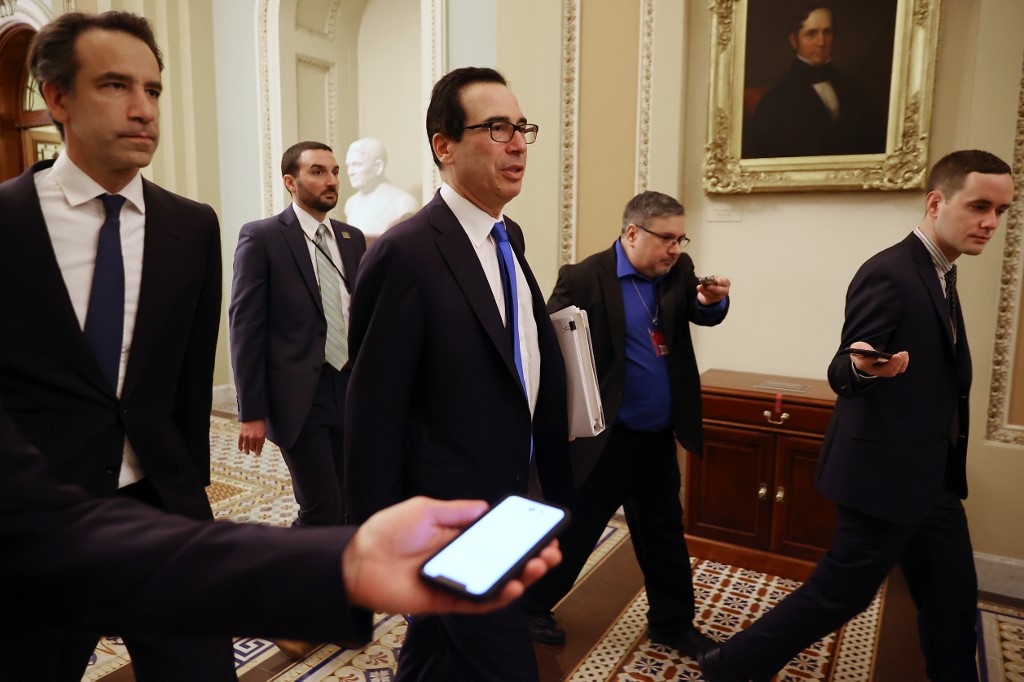The Senate and White House reached a deal on a $2-trillion stimulus package for the US economy and millions of Americans ravaged by the coronavirus crisis, a top lawmaker said early on Wednesday.
“At last, we have a deal,” Senate Majority Leader Mitch McConnell said, citing the massive “wartime level of investment into our nation.”
The Senate and House of Representatives still need to pass the legislation before sending it to President Donald Trump for his signature.
US lawmakers worked deep into Tuesday night trying to seal a deal that buttresses the teetering economy by giving roughly $2 trillion to hospitals, businesses and ordinary Americans buckling under the strain of the coronavirus pandemic.
It took more than a day of intense, protracted negotiating to produce a viable outcome, as the two sides – plus the White House – haggled and the US Senate remained in session through midnight.
Top Senate Democrat Chuck Schumer met with Treasury Secretary Steven Mnuchin and told the chamber there were only a “few outstanding issues” that he expected would be overcome in a few hours.
Billions for hospitals
The historically large measure aims to put cash directly into the hands of Americans hard hit by the crisis, as well as inject billions into hospitals desperate for medical equipment, to provide grants to small businesses and loans for larger corporations, and expand unemployment benefits.
After days of vicious partisan infighting over what to include, in what appears to be the largest emergency rescue package lawmakers have ever passed, optimism remained that the package would pass.
But several hours after a dramatic rally by Wall Street on anticipation of an agreement on the stimulus package, the deal was not yet done.
Mnuchin, shuttling between the Capitol offices of Schumer and Republican Senate Majority Leader Mitch McConnell as they hammered out the language of the bill, said they were “getting closer” to a final product.
The Senate failed on multiple occasions in recent days to advance the massive but controversial Republican-led proposal, and pressure has soared to swiftly reach a compromise that provides relief for hundreds of millions of Americans.
President Donald Trump had called for an immediate resolution to the stalemate. “Congress must approve the deal, without all of the nonsense, today,” he said on Twitter.
“The longer it takes, the harder it will be to start up our economy. Our workers will be hurt!”
US stocks soared – the Dow Jones Industrial Average closed up 11.4% – on the prospects of a stimulus that could send checks to Americans potentially amounting to more than $3,000 for a family-of-four.
Democrats rejected the original Republican package, arguing it put corporations ahead of workers, including health professionals on the front lines of the battle against a pandemic that has infected 55,000 people and killed nearly 800 in the US alone.
As the hours ticked away without a deal, several lawmakers voiced their anxiety.
“Pass the damn bill. Stop negotiating. Enough is enough,” a visibly angry Republican Senator Lindsey Graham said on the floor, after accusing Democrats of “nickeling and diming at a time people are dying.”
‘Finish line’
But the relief package still needs to clear the Democratic-led House too before going to the president’s desk.
Speaker Nancy Pelosi, a Democrat from California, suggested the bill might even pass the House by unanimous consent, saying: “We’re in the red zone and hopefully we can get it over the finish line.”
But getting 435 lawmakers to swallow a gargantuan rescue package without debate could be an uphill proposition in a sharply divided chamber.
McConnell’s opening bid included one-time “recovery rebates” of up to $1,200 for most adults, and hundreds of billions of dollars in loan guarantees to industries hit by the crisis, including airlines, and grants to small businesses.
Democrats fumed that the measure did not mandate that companies keep their employees on payroll. They said it provided insufficient oversight on corporations receiving the infusions, and that hospitals were in dire need of equipment like protective gear, intensive care beds and ventilators.
Shortcomings addressed
Those shortcomings were addressed in the compromise, Democratic leaders said.
Schumer said it will almost certainly include a guarantee that the federal government will broaden eligibility of unemployment insurance and pay full wages for four months to workers sickened by or laid off due to the pandemic.
Pelosi meanwhile unveiled a more generous, roughly $2.5 trillion counterproposal that included ambitious elements like guaranteed paid and family medical leave, student loan forgiveness and oversight of the $500 billion earmarked for corporations.
AFP























